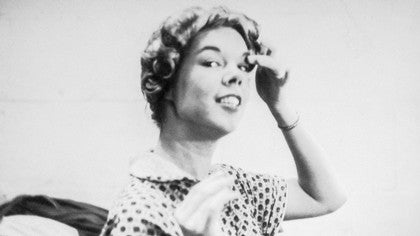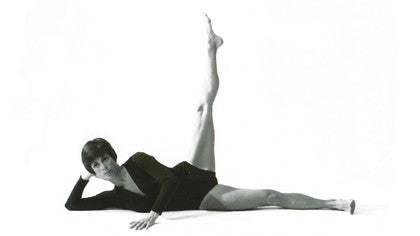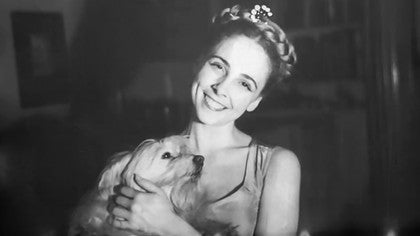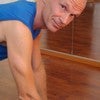Description
Mary's back improved after only two lessons with Joe. Since walking into Joe and Clara’s studio fifty years ago, she has taken one to two lessons every week for all those years. Her New York City Pilates teachers have been: 6 and a half years twice a week with Joe, Clara and Hanna, 7 years with Bob Seed, 7 years at Romana Krysanowska’s, 7 years with Kathy Grant, 7 years with Bruce King and Jean Claude West concurrently, and since 1995 with Christine Wright.
The time and expense of lessons over the years has insured the deepening of her Pilates work. She recommends that all Pilates teachers should find someone excellent to watch over and guide their own Pilates practice. This can be pivotal to the development of oneself and one’s teaching.
About This Video
Transcript
Read Full Transcript
Chapter 1
Family Life
Mary Bowen has been teaching or doing the ladies for 56 years. She's actually been teaching for 39. Her first teacher was Joseph and Clara [inaudible]. She's also trained with Bruce King, with Bob seed, Kathy Grant Romana and Chrissy Nasca, John Claude West, and currently still Christine. Right. That's not all. Mary Bowen is also a union psychoanalyst.
She's a lover of animals and she's still teaching and sharing with us and she happens to be here. Welcome Mary Bowen. Thank you.
So can you take us from the beginning?
And she was a big Wigan at Yale and here was one of the students. She was helping who is partially putting herself to Yale because his father died. And um, [inaudible] they fell in love. And this is a time in the life when my mother was always a little embarrassed about being older as my father. She never made, made it public. She died just before she met my current husband who's 19 years younger than I am. And it would have been good for her to see that.
It was a crime unless they proved or you proved yourself to be genuine. And he did. So he was given a job to go with the Red Cross to build houses for the displaced persons in France. So he was over there and writing all those letters home. And at the same time that he was over there, the Russian revolution was going on. And then, you know, when the revolution, but then the revolution is going on.
Everybody's hopeful and optimistic that everything will change for the better. And My mother was very wise and he would be kind of a glow about what was going on in Russia. She'd always call me him town, don't get too excited about this, you know, and she didn't want him going off any d band. She could just keep him, keep him grounded.
She had, she had to give up that at that point, uh, in, in feminism that you didn't do both. You, you did one or the other and she didn't want to stay. So it should be big person on campus or you know, with all the friends she had. And he, she has this graduating senior as her husband. She didn't want to overshadow him and that's real reason she gave up
She was one of the first women social socialists that were social worker. That was really famous and she put herself in a, in a home, right on the Strip in Chicago where the mafia, where most operative to try to bring another attitude and spirit there and help. So many of those people were hard up at 1930 so my mum and dad lived there and my first sister was born there and, and she said, you always hear the, the, the uh, sirens out there and you out. And there is lots of funerals, lots of funerals and that [inaudible] landscape in the first year, their married, how many siblings do you have? Two older sisters. They're close together.
And then my mother would have been satisfied with two children when my father wanted another one and he wanted all girls and he got it. And because he didn't want to have a son who went to war and we would, every one of us have hit a war. My sisters would have been in World War II as boys and I would have been in the Korean War. So you know, he had great instincts in he, he, he, he got what he wanted. He was very happy with his three girls. We went from Washington d C to Tennessee, to Tennessee, and then we went back to New Jersey where they'd rented the home they had that they left in the first place. So, and then my grandmother had a cottage on the long island sound and every single summer all her children and their children had, they, they, we, we all ended up in this house on the shore and Long Island. So we had a lot of cousins and, and good chance to feel big family.
Chapter 2
Mary the Entertainer
My Dad went and brought me down and I meant to entertain people and I went to Middlebury college and I was very depressed up there. And, and I don't think they understood it too well. And what they sent me to this doctor in another town and he said, you've had a nervous breakdown. So I cried a lot. I cried a lot. Wow. I'm depressed. Oh, I couldn't answer everything I wanted to know. There was no answer anything. What's the meaning of life?
What is, what is God? What is what everything.
So that's what I did. And I went to Yale drama school or that depressed me because, because you can't be told how to act. You, you, this is something in eight or, or it's not. And yet they don't expect that everybody will be unnatural. So they almost were taking my creativity out of me. And so I thought, I, I can't stay in this place.
So I left there and then I went to the American theater wing in New York, which was much more, uh, varied. And then I began to, uh, I attack to take a job. Um, I went to the Irving Berlin corporation and I was a secretary there. And, and this was then at that point I'm about ready to get married. So my husband's going to, he's going to be a doctor. So it's time to go into, uh, internship or you know, you after. And so Bellevue hospital was where he went. Um, about what year are we now? That's 1990, 57 probably, but we married in 1955 and we married it repaired Battell chapel and Yale University.
And there may be yells and my father graduated my mother's age. She's been like a family place. So, um, no, I, I think, I think I was in love. I thought, I didn't think I was in love. I don't know if you know really what love is at that age. I was 26. He was 24. He certainly didn't know what love was because he was a sinker and the way at the bottom of his unconscious was going to be his feeling. And he wasn't. He was, he'd have to go through a lot of shit before.
He would be free to really love. But those are the years he spent with me. And, uh, I was like an anchor for him so he didn't go off cause he, he had temper tantrums in his wrist, feeling functioning was very primitive or, but he's very, very, very sweet loving man when he was, but he got to be like a Dr Jekyll and Mr. Hyde to me cause he would, he either be there or he'd be drunk or he'd be there. We don't. And, and um, you couldn't have social life because you didn't know what he'd be doing. And, and I was pretty much like a monitor, uh, holding everything together in those years. But I loved him, you know, and I found out, I guess it, a therapy was natural too. And being somebody working with a disturbed person was natural too. So, you know, therapy here, we both went to the same analysts. Well first I went to the analyst is wonderful. All Gust Dutchman, big tall.
Oh my. He's a beautiful man. And, and he, he, I went first because I was told I should go for being a comedian in this nation, for being a comedian. Being a top comedian. I now this tall and I was expected to do that and I couldn't do it. Anybody who saw me, I don't know if I w whether they're afraid of success. Well, what, but I, I could not, some part of me pulled way back and I thought, well, maybe I have a problem I should be working on with the two others of my friends from hail were going through this man. So there's a natural one to go to. And I went to that man and I think I entertained him for one whole year.
I just went, made sure every time I came that he had a good time. I mean, it was like one of the most natural things that I would do. And, and we didn't get it all into a problem, really for a whole year because I was so busy entertaining him. But, but very soon he said, I think your husband needs to be here more than than you, because I could just explain it. And of course he did need it, but I, I mean, anybody can use it, you know. So, uh, I went to my husband and we were about to move to Washington DC. He had to, you had to do military service sale and he as a physician could go instead into the public health service, which we were going to do town, Bethesda, Maryland. So we're about to move down there from New York. And I say, he says, my honest, he says that he thinks you should go more than, than I god Damn as hell. He said, I knew we never had any money. Well, he was really meaning that because he saw that, you know, that is expensive, but it wasn't run. You compare it to now it was, but everything was proportionate.
You see? So, so then we both went and we would be in down in Washington and we'd take either the trailway bus up or we'd drive up and, and did that for two years, you know, as that thing, he was starting to break apart my husband a little bit. Um, in that period because the feeling function is gonna put the forest function at anything at the bottom of your psyche and unconscious is going to put you through hell. And it's in so scary place that it's just in total contraction. What's yours buddy bodies are fourth functionality. So my body was healthy but so tight, so tight, all of the muscles to all the bones so tight that I had never read really until I was almost 60. Really. I mean I could, I could see I was seeing, I got a whole Merman. I mean good seeing as huge voice. It wasn't so much on, on breath, it was on spirit. It was how the innate sort of talent.
But uh, I lived my whole life with him without breathing much and the energy that I seem to have I think was all hysteria, you know, and you, I was just wound up like that. I that the,
Chapter 3
Working with Joseph Pilates
now this is an end plot eas that the year when I started 29 years old, I, that's a year when usually your ego was pretty much worked itself out that the is got you as far as it can go. You're going to have to go deeper and find out your real self and get on that journey. So I'm at 29. I, I went to this analyst to see why I couldn't go for the big time and I found I was quite right to resist that. I was, I was, I was resisting. And in fact, I would say always look at resistance as a positive way that you're being saved from going off your own track. And I think it, my creativity was not going to be making people laugh all the time. It was going to be a much deeper, uh, journey into the, the just the fullest journey you can take into yourself. So how did you get to parties then? It sounds like it's around the salons.
I was beginning to have slipped discs and my neck went out on a holiday and then I was in traction this way and my back went out and then I'm bed in traction or with a thing over the bed. And I always came back, you know, I just made space enough that it hit, but it was not a good prognosis. I thought for, I didn't know that I had limits and I would always overdo and uh, I was strong in will are strong in intention, but the body was not connected. I'm an intuitive, you're not in your body, you're up there flying like a bird, you know? And so, uh, I saw this article and I was at while we were in New York City and he was at Bellevue. I was working as a secretary for the Irving Berlin Corporation. I didn't really read the paper spot, read it. Well, I saw this man and he's standing there bare chested and he got a mane of white hair, bare legs and, and big, big chest. And you don't see this in the paper very much. You know, who is this? You know, he looked like a human lion to me, you know, and reading [inaudible] Joba of Joseph [inaudible] is nine 39 eighth avenue. And, and what he calls it, he calls it call and talk contralto [inaudible] and then in there came to the sentence, I based my whole method on the baby and the cat that I had never had a baby and I'd never had a cat.
I just believed that I went right over to him and I never have had a baby. It was not my myth to do that. I'm supposed to be the whole thing without children. A woman can be the old thing just to sell. It's a new kind of thing, you know. So I walked in there, creaky old building, walk up the stairs and the store all the way across and then you go in and it's very, very male place or not a single thing of arrows, nothing pretty in that place. Just strictly male in business.
And they're German too, so more so and, and he comes up with his bare chest, his tiny little chunks. Um, and I, uh, he could meet every new person and I, I said, I've had back problems and I read the yard, an article about you and I think, uh, maybe you could help me. He did had sounds he made that were like it where in Japan they say, hi, hi, hi. I get it. I understand. And, and, or we say, okay, I see it within, and he just went, Ooh, he got grunts. And so he, he said, could you come three times a week? Well, my God, I mean, I'm going to taking the train from new haven, Connecticut. I said, I couldn't do, I couldn't do three times a week. I, I maybe possibly could do two times a week. I come by train all the way from above new haven. So he, that was okay, that, that in he had to, he had to accept it and then he had this sound and then later on in life when he's dead.
And he came to me in a dream when I was going to begin to teach and he said to me, I want you to only do [inaudible]. And he really was Joe and he had been dead in 1967. And this was, uh, this dream was, uh, eight years, eight, eight, six, seven or eight years later, he haunted this place until [inaudible] came in. He haunted everyone. He really haunted me because he didn't expect this of me from what I came in as. And what I turned into was two different things, but he was watching it and he knew I, and he was going to give a push to every teacher Palazzo days until this was established in the world, whether it was dead or alive, he was still pushing.
This is harder. So he then, and he came in another dream when I opened a big studio in Massachusetts, and this will now was, was saunas and massage rooms. O, d, l, N and N. And so interesting that he followed those moves that had to do with the method. And, uh, he came in and, and he, I, in a dream, I said, we a room and several of us were teaching and he sat in the chair just inside the door. If you wanted to come and watch, you could sit two chairs there. And I saw Joe, and this is the dream. I said, the first meeting of PMA when we first got together, a hundred people in a little room in Miami, and we're asked that we will see the elders. Uh, Lolita was there, Kathy was there. We were asked to speak. So it was, it was a [inaudible]. That's real. But, but I, out of that, I told them this dream and then this was the magic moment that, that dream was perfect for this moment. I went over and I sat on Joe's lap and I guess he really was a father figure, you know, um, and, and I said, I'm trying Joe. And he said, I know who you are.
And I said to the audience until I, we all, we're all trying each in our own way, and maybe we all, after the net last suit is done legal suit with in Canada between start. And Diane Miller was a dear friend of mine who got sick from the suit that she had to have. But, uh, I said as soon as that one's over, may no one ever tried to own the plot, his method again. And Joe was so present and, and the spirit was so high and it did heroin in the room. And um, and it really is, my stance has always been there's no one way to do polities. There's as many ways to do it as there are people doing it and find your own way. If on your own way, go with your teacher while you're with her, but don't figure out you're a cone of anyone.
You're going to be an original proponent of this. And so I've never gotten into a fight anywhere cause I've stayed apart from him. Can you tell us what Joe was like in the studio or what your experience with him working with him as a teacher? Joe, when I was there, it was 1959 he was 76 at that time. I'm now 84 and I don't feel old. And I looked at that as he was an old man. You know, I was only 29 and he was 76. And, and that you know, it, you, you, the way where you look, film is different all the time, every age yet. So, you know, nothing much is different except that I look at my skin and I think that's getting to be old ladies skin. But that's the only thing I could see, you know?
Well, um, but he, he was already not giving full lessons. We've been doing this since the 1925 or six and maybe before in Germany this method was already in Germany. It wasn't only Joe's creation and he brought it over and then he course added himself to it. But um, you know, he was not that creative. He was more repetitive and he be creative. The problem came that was so hard that he have to be, and then he could be, because it was his fourth function. It was where his creativity would have been, uh, coming from intuition. I think that's really interesting now because I'm hearing two things that he was repetitive, but yet he would also change things based on he could, if he got a bet, he got, he got someone, one of the [inaudible] in one case, one of the, um, oh my, the name just went out of me.
One of the rich families in America, Vanderbilt's was in her bed if in a fetal position with arthritis and someone in the family called Joe to see, and Joe opened that whole woman up to natural natural posture again through the tower. And as I think the tower is most fascinating thing for someone really bad off where you got to do it, you know, very solely all sorts of modifications. But you have the, you will find the extension in the whole body. They're under, in a close chain. No. So he did that and, and he loved the Cadillac the best. I love the Cadillac, the Bas. He would say that. Yeah. Yeah. It does everything. It can do anything.
I'm thinking of new things on it all the time. Joe was, Joe is nothing else in the world that he could see or think he meaning he wanted, yeah, he just, he was, was, he had blinders on him like a horse and, and, and he ruled and Clara was a obedient in that way. She was much better teacher because she was intuitive and knew what you needed. And she didn't teach much, but if she ever came and lay hands on you, you never forgot the lesson in it. Really. She had, she had this gift. He was the, he was the mainstay and any, and I mean, she totally honored him. And, um, and it was natural for a German woman to stand behind, not so natural for an American woman anymore, you know, so that was quite amazing. But, um, he, he's trotted and he was going in and out of his quarters, which just the next studio over and he had a cigar probably he killed himself with cigars. And, uh, he was in the, I'll tell you about the fire. No, no. He had his garden, his mouth too much of the time and in the studio sometimes, but not so much. He probably go, I have a smoke in there and I drink too, you know. Um, he, he, he went that way, not, not by belief, by disappointment, frustration and just hit, you know, cause he couldn't get the American higher ups in any regard to regard him as important. And, um, he didn't have any social skill that could sort of seduce someone. And so he in fact would, would think he was so much better than any of the doctors that he'd, he'd put them off further. And you know, it, it was his fault too, but it was not the time yet for even fit fitness.
It didn't come in until the 1970s. He was dead. 1967 and we thought he was 87. No, he was 84. Right where I am now. I be dead. You know, if I were Joe, I'm not about to die, you know, I don't know. I don't know what that is yet. I'm starting to sing a bit more. And the best way to think of that was describing to someone and a panel in New York, who are you? And I said, um, I am an intuitive person and born that way.
And now I'm sensate as well through philosophies. But my interest is in the next new thing, always in the next new thing. And they say, why didn't you start a, didn't you make a big, big thing of your, your training program? Well, I tried it one summer and I didn't like it. I need you in Massachusetts trying to format everything and give the same thing to everybody. And I, I didn't, it didn't feel genuine to me. And I said, I couldn't do that because I was going to be doing new things all the time. And which Maryville and would you have trained with, you know, there would be nothing. It's just two original. So, and then I said, and I said this right out of, uh, out of just, um, spontaneity and never thought it before. And he said, and so, and it'll come to a time when my body will give out and the next new thing will be to die. And God, that a wonderful way to look at it. That is wonderful.
That came right out of me. And I thought that's the way to look at it. Then a continuing, yeah, another new thing. And to Mary Bowen, it will be new. Not to my soul line is an old story, but not to me. You see? So, um, it's going to be very fascinating.
Um, and I've, I have all sorts of, uh, information from other people's dreams and my own dreams and that, that, uh, the dead are not very far away and that some of them stay, well, Joe stayed until it's still established. He's [inaudible]. He's no longer, that's all he wanted. He wanted the whole world to do it.
Chapter 4
Joe's Legacy
The fire. Yeah. Well, yeah. And then this leads into the death and, and in a way that you don't, that people don't understand. Um, it was in 1965 there was a fire broke out in the store room at the back of the building, 99 big building with a long haul. Bruce King had an apartment back there across from the showroom. I was with boosts king and I got the whole story because it'd, believe me, he was there. And this is why this is the truth. You know, and, and, uh, the firemen came and they asked to place, you know, they, they tried to seize it under the floor is it, so they did some damage to the floor and got that out.
But boosts King's department was so full of smoke that he had to move out. But as he was telling me that story, um, he just was telling me a little more, but now everybody's in boy. He said, did they fight at night? Who, who fought at night? Joe and Hana chilling. Hannah. Well, Honda taught me the method first. She took on all the new people for, for people who don't know. Can you talk about who is Hannah? Hannah was, they were the three. They was Joe Carr and Hannah. And from the time I went and eventually Bob's, he came in to hope to be, that's all there were. And, and um, I'll tell you about him, but, but um, Hannah was a German woman. Um, she was look more male than female. She was very muscular. She had a, she wore a tee shirt without sleeves, all rippled muscles and she wore boxer shorts that nothing to tell you. She's a woman. [inaudible] and muscular, muscular legs, powerful and um, short hair, you know, Bob sort of like in the 1920s, and, and uh, a wonderful, thorough person to in initiate you into the method.
And they used Honda to break every new person in. And so she was mainstay teaching mainstay of that. Ms. Carr wasn't teaching anymore. Joe Was not really teaching Honda was it, you know, and, and so, um, Joe, yeah, he said hunter was his mysteries he lived at, in the back. So he was close to the, all of them. Clara was up front with Joe and they live together.
They work together. They, they move together. They, this was the family, the two women, the one that's probably was tired of sex with this man who was unrelenting I think. And then, and he'd had lots of women, but he's now older and he's just down to having Honda. And so he said they fought that night. Will you want to imagine what that was about? Well, so, so, but this is mysterious. Hannah. Hannah was anybody's mistress. We just that really into intuitive person.
I could all understand all my life as a little child that my uncle was really having, having something with lie that is the daughter of his housekeeper. I, I could see that before it was ever stated, you know, embarrassed everybody when I said, well, if I, if I don't love my daddy then, then uncle Tom doesn't love Laila. Oh, what is that come down to the child. Nobody knew that. Nobody, you know, but I never picked up a vibe ever. They were totally professional. They were all about work. And you very rarely heard any personal saying, ever say that. I heard it twice. W W mainly once.
And I think Lolita heard one and you know, they did not put their PR, they didn't even have much of a personal life except that those three were in the unit because all they did was work with philosophies. It was PyLadies that was their life. And they didn't talk about much else. They didn't talk about politics, philosophy. They did. They just, it was a very narrow and completely committed to that. And you never saw a more committed knife. So, so, but when he said yes, he said, um, the harnesses mysteries and he said, she will, Clara will go get the car, go up to, to Beckett where they had a little little bungalow and clean it and make the dinner. This is Clara the main board. And then Joe and Hannah would arrive later and, and enjoy the dinner. I said, oh my God. I said, you can get an American woman to do that.
You almost wouldn't think of anyone being able to do this. That the mistress and the, well, she wasn't a wife, they never married, but that was his, his real unit. But by now it was a three unit. And, and when Joe died, uh, Cora and Hana, we, we t friends and they tried to con, but they couldn't do it without Joe, you know, so she was the car. It was always looking who could do this with, um, and it would have involved seed. I mean, he was being groomed and he was same shape. You know, he's like another, a younger Joe. And, and he had come to Joe, he was a professional ice hockey player and he was so muscle bound when he came to see who was Joe. He couldn't do one thing Joe wanted him to do. And he was so angry at himself. He worked on his own for about three, four months, came back, did every single thing correctly.
And Joel hired him on the spot and that was really gloom to be his successor. But I've got moved a lot of people in my life that would, I've, because I was never going to stop, but in case, you know, uh, and they never stay, they're all gonna go, they're going to go do this thing. And so I, I just, that didn't surprise me, but, uh, it's, it was Joe was getting unwell, so it was difficult to have that happen.
When Joe had gone, one will last time to Germany and his legs were now all purple, black pratically, there's no circulation. And, um, and probably I didn't see him then, but probably having a hard time breathing and, and Bob went over to see him and he came back and he said, it's very disturbing to see him that way. It [inaudible]
He had a whole business going over on the east side, you know, and um, no this, yeah, you just, you don't own anybody that works for you. Don't think you do.
So Joe next day went into the studio and where they had asked the floor, he slipped his leg into, into that hole and scratched his leg. That's the entire damage. It was d and from the fire. He didn't hold on until he got saved? No, no, no. He just, he just, he just scratch his, went down a little and crashes and, and uh, until uh, the end, he just went to see, well, what was the damage of the stuff that back there and Bruce had to move out. And uh, I went, when I went to England, a woman in very elegant woman in one of these lem places where I taught, she said, what I read in the New York Times that he died in a fire.
And I said, well, they were wrong, you know, because I can say that knowing that Bruce was there the whole time, you know, and well, he died of cigar smoke. How many years did he smoke cigars? He black and his lungs. And uh, that a plus too much whiskey. And uh, and uh, you know, just, he was 84, two, he was 84. When I, when I think that he was 76 when I started there. And that's just what, eight more years, eight years is, he's dead. I mean, there was no sign of any problem. And even when his chest, wherever he was, his just was huge. And so, um, I heard him little few times, I heard him, I think say to Clara, I can't breathe. And I don't think anybody believed him because he's known for that.
You know? And I think why his chest was so big was that you held your navel to your spine, you telled your glutes tight, your whole from waist down in that pelvis was held tight to support the spine because we were doing flat back still. And there there was, it was [inaudible] all muscularly controlled and you want to take a bed, you cannot take a natural breath with that much tension. You can only breathe up. And it all went into this, you know, and that was abnormal, I think. [inaudible] emphysema then. Yeah. Yeah. He couldn't read. It was emphysema from cigar smoke and, and, um, but that was because of his dejection, his own depression. You know, it was not a happy man. He was over in the hospital and Bob's raw steel, John Steel Hood, I can't remember sometimes whether it's John [inaudible] and he was very friends. He even all people, he, you should speak to him about what Joe was like because he would have lunch and dinner with them and he was like an adopted son that they never had.
They just took him in and he, he, he paid the rent for Carra when Joe was dead, they got her a new apartment. She wouldn't move out of that place. Barren as it was, it was home to her and she was close to him there. So she stayed there another 10 years and they paid her van to know that he, but he was close to them in that friend way. So he was there as Joe was close to dying and, and he said he, he, he indicated it to the remote, but there might've been a guard on the door of that room to gave Joe film running out. He hated being in the hospital. He hated everything that he had to live.
He hated the, the breathing problem here, and, uh, was not going with any tranquility to the other side, and he didn't go to the other side, so he just stayed around. But, but, um, he said, and I think I'm under so much that, that this was really, Jill was her whole life was about this. And, and he was honest, he was loyal to what his vision was and he said it to the whole world will be doing my method. He said in his Ha hardly speaking and that two days before he died. And I've, I feel so good that he went out with that. He never gave up on that. And that's why he haunted us because it was not out there and it was still under litigation, you know, and, and, um, he, I know that it was Joe. I was not [inaudible] that up. I, it was not that big of precedent for you. So, so things have taught me that it said, um, you know, any scene with anyone who is robbed of their intention in this life, it's easy to tell, be born, right. Again, sometimes that can happen or they won't leave this, this earth easily. They'll will, they'll be watchful and you know, and you know, he was a teacher of that even. And Joe is not a spiritual person, you know, he was just real and he was totally male and, and it was, he was soft on women but, but he was soft on women probably because they had boobs.
And that's what he was tough done.
Chapter 5
Becoming a Pilates Teacher
you became a teacher of philosophies shortly after you became an analyst. Will five years, five years after, and then whether they intended to be an analyst. I never intended to be [inaudible]
How sort of Pele's [inaudible] my clients that were seeing me for the psyches wanted to know, what do you do on this stuff? You know, she, can you show us something you do on this stuff and, and they just will be passing the machine. So, so you got a studio, a studio up front, and I had a flat and this studio B room in the front was the analytical office. And then there was a little room in between. And then there were two rooms that ran into the kitchen, out to the fire escape and then the bathroom and they had to go through this, you know, and, and they all sort of combusted at the same time. It was, it wasn't just one, it was a bunch of them that wanted to know what do you do on this stuff? So I went to Ramana and, and I, this was where intuition again help because she's Sui fan then she's already suing people for success set at least trying to extend it anywhere. She, she close and friendly and down in Boston, she was going to extend it to Boston. And I didn't, I didn't know anything about this, uh, 1975 and, and um, so I just said Romana my clients are very curious about what I do on the machines and uh, what, what was, what do I say to them?
I'd been doing it 16 years and, and um, you had to do a 10 years, there was no certification. That's just a way to make money, but you had to do it 10 years. It was in you, you knew, you knew what it was and then you were to be able to teach it. And I really believe that was a good way, you know, you were in that thing before you taught it. So, uh, she said, well, you've done the right thing to come to speak to me. I will speak to the board and let you know next week. Have you already worked with Kathy? Rob? No, no it was, it was Joe and Klara. Bob Seed.
And then Ramona for you had already worked with her when you went back to ask her this? No, this was when I was working with her. This is in that seven year hitch and um, and then came Kathy grant and yeah, so, so I think the board was John Steel. I don't think the attorney at that point. Yeah, the attorney or was to Joan. Clara and now John Steele, I had not. And I myself are good friends, but he's the most invaluable human being. He, there's no show at all about him. So what was she asking the board? What? Well, her idea was in it.
She's thinking of the litigation and no one is. And she said, you may teach your friends, but you have to develop your own name. Now why is she saying to that? When I'm just seeing a t she my friends, there's no way I'm thinking of making a career of this. I'm already a psychoanalyst, so this is all my gift to the world is my philanthropy. Is Philosophies so far. You don't mow over a long time. 10 years, no charges. It was awful. Lancer fee. So, so then, uh, she said you must call it your own name. You cannot, they say [inaudible] studio.
That was the only thing she got with all her trying to get the whole method. She didn't get his piece of machine me, she didn't get a single exercise. She got the name [inaudible] studio period. So that's what she could sue people on.
I went from the basement all through the place and I could have put it in places where people saw you. I W I but I'm, I love retreats and I went way up in the top of the building, a big room with sun in the afternoon, coming through an a hole, a string of space to make the massage rooms and, and I did it there. So a lot of the town never saw it. They don't go to the top floor, you know, and that top floor with it w this was an experiment, these, these young people that bought this big old department store and for the top floor it was all to be creative and it would be art and it would be dance, it would be theater, it would be the gym, which they considered thank God. So it creative and, and an afterschool for children. And that was all free rent. You know, you've got to have a benefactor. Romana had a benefactor. She never paid her rent. Some rich client paid her rent in New York. So, so you just needed, you know, you don't survive that we don't make money on [inaudible] the 2000.
When the suit was over, it was like, uh, you never saw so much interest now because everybody could become a bloody teacher. In fact, good or bad. Well I think it's good. It fulfills its hurt of dream of Joe and Flores that the world now lets it in. And um, it doesn't worry me that there's all kinds of daft ways and, and deep ways in all kinds of ways that will work itself out. You know, if you're in it for money, you're not going to be very good at teaching it. Cause you're gonna want them to go in and out of there, you know, and, and it's not going to be personalized enough. And you know, it's a lie.
It's a work of love is a life of philosophies you giving yourself. You give everything you can and you are giving your voice, you're giving your body, you're giving your mind, you're being given your intuition. You, you're giving your heart. I mean, that's what a plot is teach you can be. And that's what a teacher should be as, hey, it's, and you grow in yourself as you do that because somewhere in you you're needing to grow and you grow along with the client. When I came after 12 years of going down into the unconscious so deeply that my
Chapter 6
Discovering Pilates Plus Psyche
analyst wasn't sure there was ever going to be a bottom, and it was, it was not an intention. You just followed the dream. Uh, and you followed your own inner process. There's that life going on and then there's this life going on and in the years where, where that's beginning to make sense of your life and, uh, be the real grounding there of yourself. Uh, you, you know, that's more important life. But eventually when Hawaii, I had, I had one dream that almost exasperated him for depths of, of where you have to go, but she be sensate in the deepest place of being animal.
I was connecting with every form of life. But with my senior teacher, I was connecting for six months, might be almost two a year. I went back to the stone just like these stones out here. And that's on the beach. I, I was a stone that had to learn to breathe and, and he was, he was so hard to be that deep. It was really like the beginning of evolution as we call it.
And then I teach you couldn't be in the room. He was behind French doors in his living room. I gave myself, I went to my own lesson and to try to moan that stone into life. And then I got into, uh, over a years old, I got into animals, all sorts of animal sounds, no inhibition there. But then I got into Gaya with great by now he's back on this piano bench. My teacher, great, huge. So, so much noise.
So it sounded it he had to go and take a shit and walk all the way down. It was just like, this isn't journey sit into sounds through me. Was no longer about seeing the song. It was bringing the voice through evolution and then I would get into sounds that were, uh, Gypsy music. Then it was Jewish music and all sorts of ethnic things that I didn't know.
I knew. No, it was in me, you know, and it was really we through till I got to my own voice and uh, then it would take me half an hour to get to that at fairs now. Then I got, I've been in there about 15 years. I, I'm now accessing my own voice and, and uh, it has such a deep bottom to it and it goes all the way up that it's, uh, well he thought he ABA, maybe he had the voice of the ages here because he never made it my singing teacher because it was so, uh, uh, encompassing, you know, and um, I'd go in there so old and so tired and then I'd get to the sound and it was just energy. Well, there's, the inside of you is never tired. There's everything, everything you can imagining there and you go out all resurrected, you know, it was really grieving. It was as important as a psychoanalyst was that work was the voice. And then I needed the base of knowing what, you've got to have a core. We weren't, every record was not, it's called with Joe's time, it's just navel to spine and that's not, we're so much more full of knowledge now. He didn't even know this stuff.
We don't now. He just did it on his own instinct. But I was calling up from primal or evolutionary that didn't know, I didn't know what I was doing. I guys going with the unconscious and that was steering me and I didn't know how squashed the woman really has been, how muted she was had become. And I was dealing with mutinous and uh, daring to, to make it sound at all. There was in that whole area, that's been the woman's experience for thousands of years. And at one point I remember I lay over his baby grand piano because I had to feel my ribs move a to know if I was breathing and, and, and the moons that came out of me, he said his daughters were in the kitchen and they crying.
They were crying because there was so much unlived life coming out of me that I was bridging. That's my, was my work, his bridge, the woman into sound. So how does that, how do you teach parties with regard to that? Well, uh, I don't try to sing. I like, I like sometimes you can get a breath person to make breasts if they make noise, you know? Um, then I hadn't found the yarn yet. You know, there was still enough binding in there. I always have my analysts being almost fed up. I mean, could you, could you not need to dream this deeply and, and, and then it, soon after I was at bottom then and I literally got a dream that said, okay, you've gone deep enough now start filling in the hole. And the hole was the whole, the whole journey that was down there and not here. And, and so if so practical, but see, I'm a sensate thinker in the unconscious years and say secret in the conscious. So I keep getting more and more practical, more and more grounded.
And you have to go the other way, get more and more off the ground area. And imagine, imagine it is, we each have to go the opposite place. But the dream that I gave him that he, he, he just was so expressive about, I was lying on my side in a part of my garden and I was counting drops of saliva coming out of the mouth of an insect. And when he heard that he hit the, the arm of his chair and he said, God dammit, you have to go. So temp t well that was, he was, he was an intuitive and he, he had to be dealing with the Sensei, but I, I didn't know it then I was finishing out his work too.
And one dream I had where I was holding part of you and it was in, in Washington, D C and, and that's where like the collective capital of the world. And, and I said, I was holding that in the dream and he said, well, I hope that's not true. He didn't want to think, you know, had to work for it. But we do work for each other. We do fill in for each other. You're doing that when you're teaching philosophies, you're filling in for this place that they don't know exists yet. And you have to hold that for them until they can get to know that you're doing well. Well, well I was, I was 20 years separated, 20 years, 1975 to 1995 only a psychoanalyst in the chair at home.
Uh, and with, with the sessions and wherever they were. And then I'd go and I would be the Polonia teacher. And at that point I was really more or less under the last big teacher. Well I guess boosting was what they had. And they also developed here I was, I was very structured and I was directive and I was thinking of it.
This is wonderful to have a non-directive to kind of profession and a directive kind of profession. Now I don't believe I am directive anymore with Palabra is, well, I'll tell you that. I will get to that. But, um, I believe now that the unconscious is informing us all the time if we allow it. So, so I just was in teaching somebody and, and they were so stuck and so did this even in destructive in their annoyance it themselves because they could not do, why couldn't I? And I said, you cannot do that because that part of utilizing in your unconscious and you can't get to that yet, you will get to the time when you can get to that. But you're too young. It's too soon. I mean that it was natural. I says nothing in natural.
This is not sicknesses is not resistance. And it gave her such, such a release that I thought, well then, then she wanted more gave you go heard of it. Everybody wanted me to do that too because it helped them understand their problems more and, and it helps the teacher know, well if you can't teach that person, that's an opposite to you. And there was a red head in fence, beautiful red head. And she said, I've been given this woman and two other teachers have passed her on the third one together. They couldn't stand her and she is, she retains nothing from one week to the other. And so, um, you know, you'd give her the lesson, you finally get her to do something and then then it's, it's, it's washed away. You right back to the beginning. And it's frustrating.
Well these teachers we send say thinkers, they, they, what's, what's the difficulty with just having the body do this and thinking this and head with those of the function she had in her unconscious, especially her body. And I said, well, you see, you and she were direct opposites and, uh, you, you deserve this woman because you're just as stupid intuitively as she is stupid in her connection with her body. And that you will get that. And sometimes it's not livable unless the teacher is far enough along that she's beginning to know that this isn't the answer. I've got to go intuitive with this woman. And then you start to go intuitive with yourself.
Now you're on your own journey. And so it can be a wonderful thing for the pies teacher. But you know, you put somebody, a feeling teacher in with a thinking client, it's the coldest experience they've ever had. And it hurts them. They can't get a relationship. They're just like some kind of a function. They're not a human being with this person. Well, this person can't get the feeling yet. And so that's, that's, um, but, but now they became that 1995 they became connected. I didn't have the words put together that's on water because plus psyche just came to me will and, and some people say, nobody knows what you mean by that.
Well, uh, I mean, then don't be Maryville and beat somebody else, you know? I mean, if they're, if they're curious enough, they'll, they'll come as they need that kind of work. They'll come, I don't need many people.
Chapter 7
Mary's Legacy
What do you think Mary Bowen, her legacy will be
I would want that person to learn to do for themselves and for others. And uh, uh, to not be afraid of what you can't do. Invite and get into the experience. Very fail, very scared. That's the beginning of your genius. In the end. It, it, all the, the creative will come through this thing that is most difficult, where you going through the most hell and, and it turns over and there's endless, endless information and resources in the unconscious. It's so much older than we are and it draws on everything it was that you need.
It is available. And I would say, uh, you have to really know miss patients to let that happen in yourself or have a patient's for your client. They're being all they can be. And uh, if you can't find a way to work with that person, the deficits in you, you got more work to do because you're not tapping all that you are yet. So it's always a challenge, um, to, to go for the deepest, most important part of you. And that's going to be at the, in the unconscious. That's where your spirit comes from.
The forest function from the place that that has just been all that tension and it's a contraction that you feel in that voice function. We work with the body, we can feel it. It's palpable with, with it sensate person. If it's intuition, you can't feel intuition. You don't see it. You know, it's just, it's just frozen. It doesn't, it. That is the quickest function. It, it has more ideas in it, then it's anchor, you know, is new all the time. It is a variation on it's IEM. That's what intuition is. Well, you know, you can't, you can't believe it until you start to do it will have one to say love too, right? Because you know, the, the, the fire's love for other people, for yourself. Uh, if you can, that you love the method, that's a start for somebody, but love your clients so that, that fosters development. You can't do it strictly and the way those old dancers did it by putting you down and that smack you down and you're supposed to rise up and do better.
You can't do it when you're wounded. You gotta be loving and supported, and you got to be really that you're not going to be really that unless you've learned to love yourself. That's a hard one. We are so full of shit. You know, we have to look into things that you usually, you're supposed to love that I don't love that part. Yes, it's part of the package. And I'll be comforting to that. You can't help that it's there for a reason and you know, it's just, uh, it's her whole body. When you say yes, there's a ret. When you say no, there's a narrowness and whether it's known that it's no, we're stuck in the negative. You've got to find a magical way, some kind of of creative way to turn that into a positive. And that's, life is opposites. We're never going to get rid of negative in the dark. We, we even need it to motivate us to feel better. Cause who wants to be stuck that tight? You know, we, you ever stop teaching? No, no.
By teaching myself all the time and I'm learning all the time. So, um, I'll just disappear. I'll just, I don't know what, I don't know what I'll be. I hope I have the patience with whatever it is. Or it could be like one little cat who just got so old and couldn't hear. Um, now they have ways to help humans. They don't stick things in cats like to help them, but accepted all of it with such grace. And it was just beautiful and just took her last breath. Finally, when I would leave that left the room and she could just go at 21.
And, uh, if it'd be lovely to have a natural test, but you know, you know, you're lucky. We were lucky we're here. We lucky were healthy that you sat down. I, I'm very happy to be here cause you see here, you'll always be my friend. Thank you.
Pilates Legacy Project: Biographies
Comments
You need to be a subscriber to post a comment.
Please Log In or Create an Account to start your free trial.































